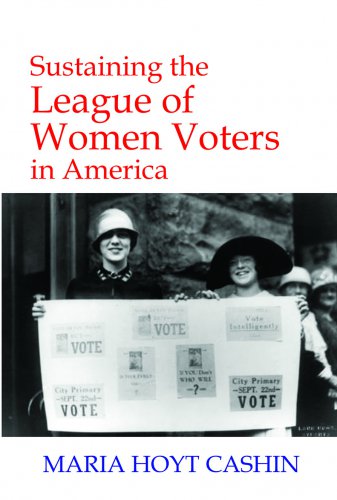
About the Author
Maria Hoyt Cashin has a long-standing interest in the non-profit sector and, by extension, associations like the League of Women Voters. She holds a Masters in Public Administration and a Masters of Arts in Liberal Studies, both focusing on the links between civil society and the public realm. She has worked with non-profits ranging from the Phelps-Stokes Fund to the African Medical and Research Foundation, as well as academic institutions such as New York University and the University of Hartford, along the way developing a specialty in publications, program development and administration for groups focusing on the African continent. She returned to the U.S. from six years living in Kenya.
SUSTAINING THE LEAGUE OF WOMEN VOTERS IN AMERICA
Maria Hoyt CashinNew Academia Publishing, 2013
192 Pages
ISBN 978-0-9860216-9-5 Paperback
For BULK ORDERS, order directly from New Academia Publishing.
Queries: orders@newacademia.com
About the Author
Maria Hoyt Cashin has a long-standing interest in the non-profit sector and, by extension, associations like the League of Women Voters. She holds a Masters in Public Administration and a Masters of Arts in Liberal Studies, both focusing on the links between civil society and the public realm. She has worked with non-profits ranging from the Phelps-Stokes Fund to the African Medical and Research Foundation, as well as academic institutions such as New York University and the University of Hartford, along the way developing a specialty in publications, program development and administration for groups focusing on the African continent. She returned to the U.S. from six years living in Kenya.
About the book
Throughout American history, our civic associations have been promoted as distinctive private-public bridges that enable democracy in the United States through citizen training, education and responsible advocacy. But Americans have increasingly withdrawn from such civic activity, and most associations that remain lack public accountability, local presence and active membership. In the absence of other engagement vehicles, a fundamental requirement for viable American democratic culture is lacking. To consider whether democracy and associations can still be positively linked, Cashin considers lessons drawn from the League of Women Voters. Worldwide, few associations have shown the durability, success or democratic impact of the League over its long history. Yet its numbers and span are gradually declining. Forecasting the League’s uncertain future in contemporary America, Cashin suggests it may be time to give such civic associations a public boost.
Praise
“Deftly combining contemporary political theory with empirical analysis, Cashin’s work reminds us that good models of democratic association, such as the League of Women Voters, can reconnect our practices and our principles.”
—Emily Howden Hoechst, Adjunct Professor, Department of Government, Georgetown University.
“Cashin makes excellent use of both theory and practice to argue persuasively that civic associations are necessary if democracy is to thrive.”
—Thomas M. Kerch, Adjunct Professor, Department of Government and Graduate Liberal Studies Program, Georgetown University.
“This book offers a welcome story and needed message. Molly Cashin reminds us nonpartisan civic activism is still possible. Numbers count, but so do values, and the League is a sterling example.”
—Charles Yonkers, Adjunct Professor, Graduate Liberal Studies Program, Georgetown University.





 Coming Soon
Coming Soon Awards
Awards